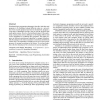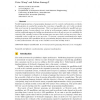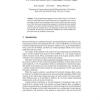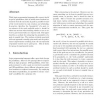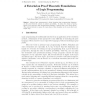162
Voted
CL
2012
Springer
13 years 4 months ago
2012
Springer
Distributed logic programming languages, that allow both facts and programs to be distributed among different nodes in a network, have been recently proposed and used to declarati...
152
click to vote
ICLP
2011
Springer
14 years 5 months ago
2011
Springer
Parallel implementations of programming languages need to control synchronization overheads. Synchronization is essential for ensuring the correctness of parallel code, yet it add...
133
click to vote
ENTCS
2000
15 years 1 months ago
2000
Abstract. Logic programming languages based on linear logic are of both theoretical and practical interest, particulaly because such languages can be seen as providing a logical ba...
101
click to vote
PLDI
1990
ACM
15 years 6 months ago
1990
ACM
While logic programming languages offer a great deal of scope for parallelism, there is usually some overhead associated with the execution of goals in parallel because of the wor...
126
click to vote
LICS
1994
IEEE
15 years 6 months ago
1994
IEEE
The theory of cut-free sequent proofs has been used to motivate and justify the design of a number of logic programming languages. Two such languages, Prolog and its linear logic ...
113
click to vote
ICLP
1998
Springer
15 years 6 months ago
1998
Springer
A number of logic programming languages based on Linear Logic [3] have been proposed. However, the implementation techniques proposed for these languages have relied heavily on th...
116
click to vote
ICLP
2003
Springer
15 years 7 months ago
2003
Springer
Abstract logic programming is about designing logic programming languages via the proof theoretic notion of uniform provability. It allows the design of purely logical, very expres...
